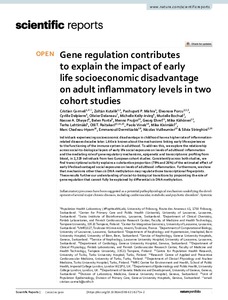Gene regulation contributes to explain the impact of early life socioeconomic disadvantage on adult inflammatory levels in two cohort studies
Chadeau-Hyam Marc; Ehret Georg; Pruijm Menno; Mishra Pashupati P.; Kivimäki Mika; Vineis Paolo; Raitakari Olli T.; Kähönen Mika; Kelly-Irving Michelle; Kutalik Zoltán; Ponte Belen; Delaneau Olivier; Delpierre Cyrille; Bochud Murielle; Stringhini Silvia; Vuilleumier Nicolas; Dhayat Nasser A.; Dermitzakis Emmanouil; Porcu Eleonora; Carmeli Cristian; Lehtimäki Terho
Gene regulation contributes to explain the impact of early life socioeconomic disadvantage on adult inflammatory levels in two cohort studies
Chadeau-Hyam Marc
Ehret Georg
Pruijm Menno
Mishra Pashupati P.
Kivimäki Mika
Vineis Paolo
Raitakari Olli T.
Kähönen Mika
Kelly-Irving Michelle
Kutalik Zoltán
Ponte Belen
Delaneau Olivier
Delpierre Cyrille
Bochud Murielle
Stringhini Silvia
Vuilleumier Nicolas
Dhayat Nasser A.
Dermitzakis Emmanouil
Porcu Eleonora
Carmeli Cristian
Lehtimäki Terho
NATURE RESEARCH
Julkaisun pysyvä osoite on:
https://urn.fi/URN:NBN:fi-fe2021042822744
https://urn.fi/URN:NBN:fi-fe2021042822744
Tiivistelmä
Individuals experiencing socioeconomic disadvantage in childhood have a higher rate of inflammation-related diseases decades later. Little is known about the mechanisms linking early life experiences to the functioning of the immune system in adulthood. To address this, we explore the relationship across social-to-biological layers of early life social exposures on levels of adulthood inflammation and the mediating role of gene regulatory mechanisms, epigenetic and transcriptomic profiling from blood, in 2,329 individuals from two European cohort studies. Consistently across both studies, we find transcriptional activity explains a substantive proportion (78% and 26%) of the estimated effect of early life disadvantaged social exposures on levels of adulthood inflammation. Furthermore, we show that mechanisms other than cis DNA methylation may regulate those transcriptional fingerprints. These results further our understanding of social-to-biological transitions by pinpointing the role of gene regulation that cannot fully be explained by differential cis DNA methylation.
Kokoelmat
- Rinnakkaistallenteet [19207]
